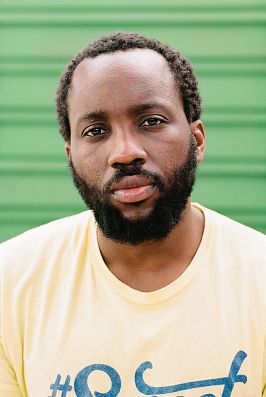Would you pay over double the price for your food in a restaurant as the person next to you because of your race? That's what chef Tunde Wey is suggesting.
Tunde Wey is a Nigerian-born chef who, through combining social experiments and food, hopes to draw attention to racial wealth disparity in the USA.
He runs a project named SAARTJ after Saartjie Baartman, a black South African taken from her home and paraded in Europe as a "freak attraction," according to its website.
Wey, who organises ventures across the country, hosted his last experiment in February in a food stall in New Orleans, where the black median income is $25,806, whereas for white people it is $64,377.
"I was just hoping to showcase and highlight racial wealth disparity in statistics," he told Euronews.
New Orleans experiment
The concept was simple: Tunde asked customers who came to his stall for their lunch what race they identified as.
If they said black, he'd take the advertised price of $12 (€10) for a meal but if they said white he'd ask if they wanted to pay a suggested price of $30 (€24), after explaining the difference represented the wage disparity in their state.
"I gave them a choice," said Wey. "I asked: 'If you're white are you willing to pay two times more for this meal, by which acknowledging this disparity?'"
Any profit after expenses went to black customers who said they would like to recieve a cut when they visited the stall to buy a lunch.
However, only a few people said they wanted to recieve a share of the money — in the end, $1,000 (€808), was split between only six people. "We proposed a solution," said Wey, "redistribution of resources."
Around 80% of customers who identified as white agreed to pay the elevated price. All the rest, bar one, "agreed in principle with the idea," but said they didn't have enough money with them or tried to negotiate a different price, which was against the rules.
"They wanted to be in control of how much more they paid and I didn't give them the option," said Wey. "I wanted to remove that factor from them and transfer it to the folks of colour."
Wey did not decide himself on the race of a person — for him it was about what his customers self-identified as.
"I had a Jewish guy and he paid the $30 because he acknowledged the economic and other privileges that he holds, despite the history of discrimination Jews have faced," he said.
Detroit experiment
Wey is hosting his next SAARTJ project in Detroit from May 2-5, where he will hold dinners with prices tailored to each guest based on a questionnaire.
He will take the same idea of disparity but also focus on self-determination and agency.
"We have a lot of affinity for a charity-based model that reinforces the hierarchies that I think are important to break," said Wey.
Full details of the experiment remain a secret; customers will be told where to sit, and the website warns the space is for hard truths where "conversations will be fraught and difficult".
"If you're white (and or male), it will probably be uncomfortable but it's all right, you gon make it," it reads.
"We may buy you a round if you act right — maybe."












